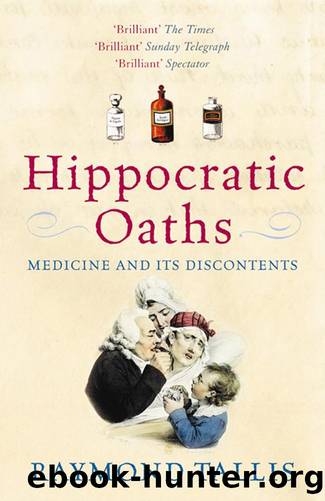Hippocratic Oaths by Raymond Tallis

Author:Raymond Tallis
Language: eng
Format: epub
Publisher: Atlantic Books
7
Representations and Reality
From grief to grievance
This [the organ retention furore] has been a difficult business for the medical profession. I believe we have been victims of poor and badly applied law, and have been let down by one aberrant pathologist. Our desire to shield patients and their relatives from some of the more distressing aspects of illness and death has been pejoratively derided as paternalism. The long-standing intention to learn and teach, even after a patientâs death, has been debased, in many commentatorsâ words, as morbid curiosity or worse.
John Bennett1
In the early hours of the morning, when I am most actuely aware of the random brutality of the world and my entire life seems an exposed surface, the fear that something terrible may happen to one of my sons cuts deepest. For a few moments I can begin to imagine what it must be like to be a bereaved parent. All bereavement brings the sense of a shared journey broken off; where it is a child who has died, this must be intensified by the poignancy of the lost future: growing up, love, marriage, a career, having children, making a difference in the world, of preparation for a life that never started.
And there is a sense of responsibility, which, as the melancholic diarist H-F Amiel says, âmortally envenoms grief â.2 It is guilt of the survivor: I continue, surrounded by these daily things, consumed by everyday preoccupations, while my child is nowhere and no longer. To be predeceased by oneâs child is to suffer an inversion of that natural order in which the elders are closer to death. The outrageously unfair survivor guilt of the bereaved parent is worsened by the feeling that one failed in a fundamental duty: I did not save my child; I consented to an operation that killed him; I did not protect him from harm; I might have done more; I watched helplessly while he died. Now I canât hug him, comfort him, take his hand, rock him to sleep. He is nowhere, or somewhere quite alone.
The loss of a child awakens other, unbearable, feelings: that someone so small should have suffered adult-sized experiences; that death and dying should take root in the tiny body and the uncomprehending mind of a child. Charlotte Mewâs âExspecto Resurrectionemâ, a poem on the death of her five-year-old brother of scarlet fever, captures this. She asks God to give some ordinary comfort to her little brother:
Dost Thou a little love this one
Shut in tonight,
Young and so piteously alone,
Cold â out of sight?
Thou knowâst how hard and bare
The pillow of that new-made narrow bed
Then leave not there,
So dear a head!3
And so I imagine how it must be, or imagine that I can imagine it. Although I might intuit the sharpest pangs, I canât really think into the endless parched places of grief. The chronic sorrow of a bereaved parent is unnarratable and inconceivable to all who have not suffered from it.
It is the very intensity of such emotions that makes them liable to expropriation.
Download
This site does not store any files on its server. We only index and link to content provided by other sites. Please contact the content providers to delete copyright contents if any and email us, we'll remove relevant links or contents immediately.
| Administration & Medicine Economics | Allied Health Professions |
| Basic Sciences | Dentistry |
| History | Medical Informatics |
| Medicine | Nursing |
| Pharmacology | Psychology |
| Research | Veterinary Medicine |
Periodization Training for Sports by Tudor Bompa(8254)
Why We Sleep: Unlocking the Power of Sleep and Dreams by Matthew Walker(6706)
Paper Towns by Green John(5179)
The Immortal Life of Henrietta Lacks by Rebecca Skloot(4581)
The Sports Rules Book by Human Kinetics(4379)
Dynamic Alignment Through Imagery by Eric Franklin(4208)
ACSM's Complete Guide to Fitness & Health by ACSM(4057)
Kaplan MCAT Organic Chemistry Review: Created for MCAT 2015 (Kaplan Test Prep) by Kaplan(4009)
Introduction to Kinesiology by Shirl J. Hoffman(3766)
Livewired by David Eagleman(3765)
The Death of the Heart by Elizabeth Bowen(3611)
The River of Consciousness by Oliver Sacks(3599)
Alchemy and Alchemists by C. J. S. Thompson(3516)
Bad Pharma by Ben Goldacre(3422)
Descartes' Error by Antonio Damasio(3271)
The Emperor of All Maladies: A Biography of Cancer by Siddhartha Mukherjee(3155)
The Gene: An Intimate History by Siddhartha Mukherjee(3095)
The Fate of Rome: Climate, Disease, and the End of an Empire (The Princeton History of the Ancient World) by Kyle Harper(3057)
Kaplan MCAT Behavioral Sciences Review: Created for MCAT 2015 (Kaplan Test Prep) by Kaplan(2985)
